
- Home
- Memories
- Scrapbook ▽
- Topics ▽
- People ▽
- Events
- Photos
- Site Map
- Timeline
 a short photo essay
a short photo essayPage added 6 November 2008
Also see History of HMS Exeter

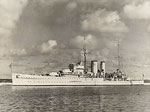 HMS Exeter, 8th Cruiser Squadron
HMS Exeter, 8th Cruiser Squadron
The
8th Cruiser Squadron was assigned to the Americas and West Indies
Station. She was attached to the Squadron between 1933 to 1940, apart
from a brief period with the 1st Cruiser Squadron in the Mediterranean,
in 1935, during the Abyssinian emergency. See HMS Exeter's history for more.
 Docked
at Liverpool 1932
Docked
at Liverpool 1932
Launched at HM Dockyard, Devonport on 13th
July 1929.

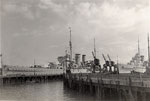 Docked at
Base Naval Puerto Belgrano
Docked at
Base Naval Puerto Belgrano
She was based in Montevideo from
January to April 1937, which is probably when she visited the base.
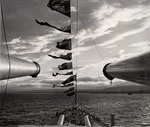 Pennants
flying
Pennants
flying
The twin barrels of her 8 inch guns - location not
known.

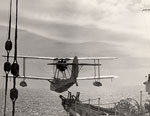 Launching her Walrus for patrol
Launching her Walrus for patrol
The
Walrus was a reconnaissance aircraft designed by R. J. Mitchell,
designer of the Spitfire. They were the first amphibious aircraft in
the world to be launched by catapult from a warship, with a full
military load.
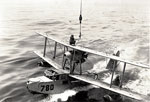 Recovering
the Walrus
Recovering
the Walrus
Using a winch on the ship, the Walrus could be
recovered from the sea after a patrol. Only advisable in calm weather!

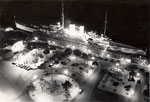 Exeter
docked at night
Exeter
docked at night
Here the great ship is docked under
floodlights at Praça Maua Quay, Rio de Janeiro, Brazil. Thanks to
Osmundo Pimentel for establishing the location.
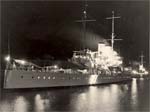 Exeter
in port, at night
Exeter
in port, at night
A photo that shows the nameplate of HMS
Exeter on her stern while docked at night.

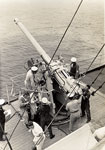 Gunnery
practice
Gunnery
practice
One of the four quick firing four-inch Mk.V guns
being put through its paces by the gunnery crew.
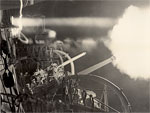 Night
firing
Night
firing
The four-inch guns fired at night, while on exercise
in the South Atlantic.

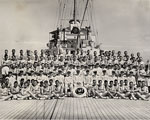 The regatta crew
The regatta crew
Group photo of
the crew involved in the St Kitts pulling regatta held against HMS
Apollo (renamed HMAS Hobart Sep 1938). Exeter won by 8 points.
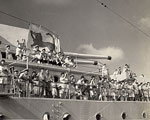 Crew line the decks
Crew line the decks
The occasion
is not known, but the crew have made a large banner with a lion on it.

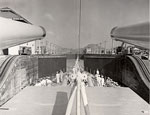 Passing through the Panama Canal
Passing through the Panama Canal
In
1938, Exeter visited San Diego and San Francisco and took part in
exercises with the Royal Canadian Navy. This was when she passed
through the Panama Canal.
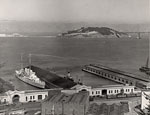 Docked
at San Francisco
Docked
at San Francisco
Docked at one of the famous San Francisco
piers - Yerba Buena Island and the Oakland Bay Bridge are behind.

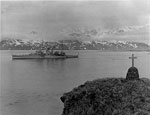 Shackleton's
Cairn
Shackleton's
Cairn
Exeter visited South Georgia. where she was
photographed anchored off shore from a Shackleton's Cairn, remembering
his heroic journey in 1916 in a rowing boat with four others, from
Elephant Island in Antarctica, across 800 miles of ocean. He reached
South Georgia at Cave Cove, and after a perilous journey across the
mountains reached Stromness, from where a rescue ship was sent for the
rest of his crew.
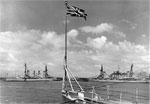 Flying
the Union flag
Flying
the Union flag
The Union Jack flies proudly over the bow of
Exeter in a South American port.

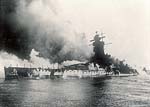 The scuttled Graf Spee
The scuttled Graf Spee
The Graf
Spee burns at Montevideo in December 1939 after she was scuttled,
following the Battle of the River Plate. Captain Langsdorf, her
commander, said of Exeter - "I
knocked out their foremost guns; I smashed their bridge; yet, with only
one gun firing, they came at me again. One can only have respect for
such foe as that".
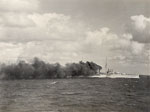 Making
smoke
Making
smoke
Making smoke during exercise in the South Atlantic.

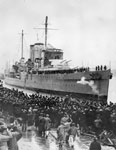 Exeter
returns to Plymouth
Exeter
returns to Plymouth
The battle scarred Exeter returns to
Plymouth in February 1940.
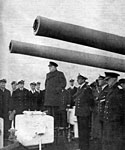 Churchill welcomes Exeter home
Churchill welcomes Exeter home
Winston
Churchill, First Lord of the Admiralty, travelled to Plymouth to
welcome Exeter home and to congatulate her crew on a job well
done. Churchill, later wrote "I
had the honour to pay my tribute to her brave officers and men from her
shattered deck in Plymouth Harbour."


 Exeter
in her final battle
Exeter
in her final battle
HMS Exeter was sunk in one of the
Battle's of the Java Sea on the 1 March 1942. The top photo shows HMS Exeter during a battle in the Java Sea on 15th February 1942. The lower
photo shows HMS Exeter listing to starboard just before she
sank.
 The White Ensign flies over Exeter's wreck
The White Ensign flies over Exeter's wreck
During
2007 an expedition found the wreck of HMS Exeter, 60 miles from her
reported position. Photo courtesy of Kevin Denlay
│ Top of Page │